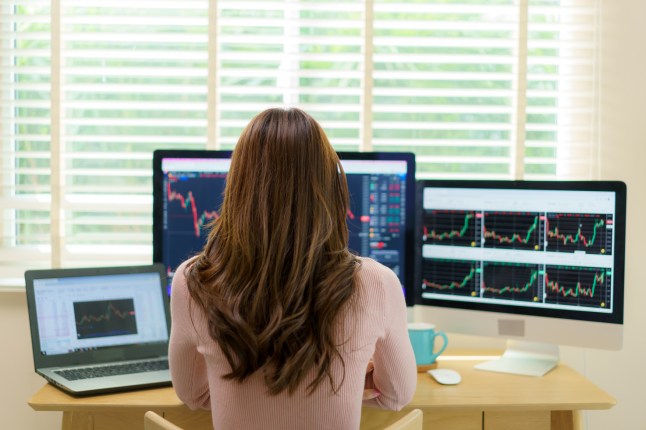
This is a nice way to save money – but doing something else will get you further (Picture: Getty Images)
Listen to article
Listen to article
Your browser does not support the audio element.
Investing isn’t a sexy topic, and so many of us don’t put the time aside needed to get comfortable with it – meaning we’re losing out on hundreds if not thousands of pounds.
Think that sounds extreme? Barclays found that if you invest £5,000 each year from the age of 18, by 60 years old, you’d have over £700,000. If you waited until 30 with the same contributions, the total would be £350,000. Gulp. It’s a similar story for someone who invests £200 a month from the age of 25. At 60, they’d have £313,000 to their name. If they delay until 35, they’d only get around £133,000.
Where the highest paying savings account on the UK market right now offers less than 5% interest, the FTSE 100 (one of Britain’s best known share indexes), interest has climbed by 16.3% since the start of the year. This is where 39% of Brits, who don’t invest at all, are losing out financially.
On the flipside, some of us who are investing are doing it too quickly, neglecting to do the necessary self-taught education. The FCA found that two thirds of Brits under 40 were taking less than 24 hours to consider where to invest – leading to two in five people regretting their decisions later on.
But, there’s money to be made from investing. Not doing it at all means you could miss out.
Why are so many of us avoiding investing?
James Bentley, director at Financial Markets Online, says that many people opt for a basic savings account rather than investing. Government figures show that between 2023 and 2024, deposits in Cash ISAs surged by 67% compared to the previous year – that’s six times more than the 10.9% jump seen by stocks and shares ISAs.

You don’t need multiple screens and an economics degree to invest (Picture: Getty Images)
To view this video please enable JavaScript, and consider upgrading to a web
browser that
supports HTML5
video
‘The trouble is leaving your savings in a cash account is a pretty good way to lose money at present,’ Bentley says. ‘Inflation is currently running at 3.8% a year – that’s more than the paltry levels of interest paid by most savings accounts. Many accounts pay so little interest that your savings actually lose value in real terms.’
Sam North, market analyst at eToro, echoes this, adding that the phrase, ‘time in the market, beats timing the market,’ is useful to keep in mind. ‘Many people avoid learning how to invest because of a mix of psychological and social barriers,’ he says. ‘A lack of education can cause confusion, particularly with unfamiliar jargon, while negative experiences, whether personal or witnessed, can strengthen the belief that it’s risky or better handled by experts.
‘The way to change this is by reframing investing as empowerment rather than obligation. It’s not about chasing wealth, it’s about building freedom, security, and opportunity. When people see investing as a way to create stability for themselves and their families, or to give their kids a better start, it becomes far more meaningful, and far less intimidating.’
How to get started on your investing journey
Educate yourself
You need to go in with your eyes open, says Bentley. ‘Reputable training providers like Financial Markets Online can help you master the basics, from the different sorts of investment classes to how to build an investment strategy that’s right for you, as well as walking you through your first trades.’
Get into the habit of reading financial business news, too, he adds. It might be dull, but it will help you understand what you’re investing in better.
Set your limits
Christian Harris, analyst at Investing.co.uk, says it’s simple but too many people neglect to write down and get clear on exactly what you earn, spend, and can afford to invest. ‘It’s half an hour that could make a material difference to future you,’ he says. Never invest money you need for your day to day outgoings and costs.
Start small
It’s a common misconception that you have to be rich to invest. Harris says to start with even just £20. ‘We often see that those that start early, even in small amounts, beat out bigger investors that don’t arrive until many years down the line.’
Go a step further and automate that £20 every month. ‘Set up automatic monthly contributions so you don’t rely on willpower. That’s what many of our team does. Before you know it, you won’t even think of that money as part of your monthly spending pot,’ he adds.
Arrow
MORE: I went from making £10,000 to £100,000 in a year thanks to a savvy business move
Arrow
MORE: 15-year-old Dragons’ Den star now backed by investor with £1,540,000,000 fortune
Do you have a story to share?
Get in touch by emailing MetroLifestyleTeam@Metro.co.uk.
Comments
Add Metro as a Preferred Source on Google
Add as preferred source
The Slice
Your free newsletter guide to the best London has on offer, from drinks deals to restaurant reviews.

